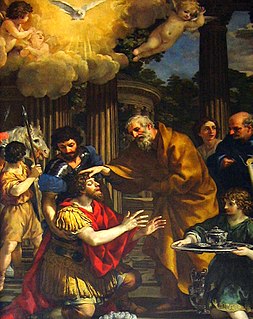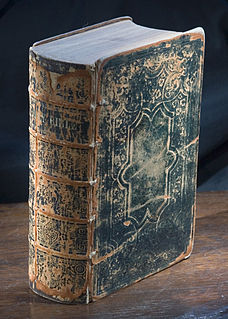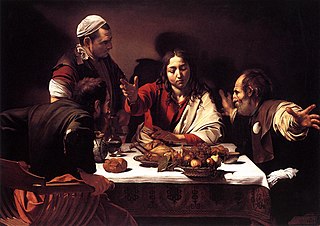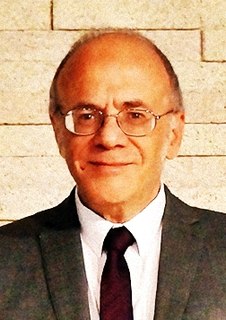Related Research Articles

The Acts of the Apostles, often referred to simply as Acts, or formally the Book of Acts, is the fifth book of the New Testament; it tells of the founding of the Christian Church and the spread of its message to the Roman Empire.

The Epistle to the Philippians, commonly referred to as Philippians, is a Pauline epistle of the New Testament of the Christian Bible. The epistle is attributed to Paul the Apostle and Timothy is named with him as co-author or co-sender. The letter is addressed to the Christian church in Philippi. Paul, Timothy, Silas first visited Philippi in Greece (Macedonia) during Paul's second missionary journey from Antioch, which occurred between approximately 49 and 51 AD. In the account of his visit in the Acts of the Apostles, Paul and Silas are accused of "disturbing the city".

The Gospel according to Mark, also called the Gospel of Mark, or simply Mark, is the second of the four canonical gospels and of the three synoptic Gospels. It tells of the ministry of Jesus from his baptism by John the Baptist to his death, burial, and the discovery of his empty tomb. There is no miraculous birth or doctrine of divine pre-existence, nor, in the original ending, any post-resurrection appearances of Jesus. It portrays Jesus as a teacher, an exorcist, a healer, and a miracle worker. He refers to himself as the Son of Man. He is called the Son of God, but keeps his messianic nature secret; even his disciples fail to understand him.

The Gospel according to Luke, also called the Gospel of Luke or simply Luke, tells of the origins, birth, ministry, death, resurrection, and ascension of Jesus Christ. Together with the Acts of the Apostles, it makes up a two-volume work which scholars call Luke–Acts, accounting for 27.5% of the New Testament. The combined work divides the history of first-century Christianity into three stages, with the gospel making up the first two of these – the life of Jesus the Messiah from his birth to the beginning of his mission in the meeting with John the Baptist, followed by his ministry with events such as the Sermon on the Plain and its Beatitudes, and his Passion, death, and resurrection.

Gospel, meaning "Good News", originally meant the Christian message, but in the 2nd century it came to be used also for the books in which the message was set out; in this sense a gospel can be defined as a loose-knit, episodic narrative of the words and deeds of Jesus of Nazareth, culminating in his trial and death and concluding with various reports of his post-resurrection appearances.

The New Testament (NT) is the second division of the Christian biblical canon. It discusses the teachings and person of Jesus, as well as events in first-century Christianity. The New Testament's background, the first division of the Christian Bible, is called the Old Testament, which is based primarily upon the Hebrew Bible; together they are regarded as sacred scripture by Christians.

Paul the Apostle, commonly known as Saint Paul and also known by his Hebrew name Saul of Tarsus, was a Christian apostle who spread the teachings of Jesus in the first-century world. Generally regarded as one of the most important figures of the Apostolic Age, he founded several Christian communities in Asia Minor and Europe from the mid-30s to the mid-50s AD.

The Sermon on the Mount is a collection of sayings and teachings attributed to Jesus Christ, which emphasizes his moral teaching found in the Gospel of Matthew.

The nativity of Jesus, nativity of Christ, birth of Christ or birth of Jesus is described in the biblical gospels of Luke and Matthew. The two accounts agree that Jesus was born in Bethlehem in Judea, his mother Mary was betrothed to a man named Joseph, who was descended from King David and was not his biological father, and that his birth was caused by divine intervention.

Marcionism was an early Christian dualistic belief system that originated from the teachings of Marcion of Sinope in Rome around the year 144. Marcion was an early Christian theologian, evangelist, and an important figure in early Christianity. He was the son of a bishop of Sinope in Pontus. About the middle of the 2nd century (140–155) he traveled to Rome, where he joined the Syrian Gnostic Cerdo.

In Christianity, disciple primarily refers to a dedicated follower of Jesus. This term is found in the New Testament only in the Gospels and Acts. In the ancient world, a disciple is a follower or adherent of a teacher. It is not the same as being a student in the modern sense. A disciple in the ancient biblical world actively imitated both the life and teaching of the master. It was a deliberate apprenticeship which made the fully formed disciple a living copy of the master.

Ananias was a disciple of Jesus at Damascus mentioned in the Acts of the Apostles in the Bible, which describes how he was sent by Jesus to restore the sight of Saul of Tarsus and provide him with additional instruction in the way of the Lord.

Disputes regarding the internal consistency and textual integrity of the Bible have a long history.

The post-resurrection appearances of Jesus in the canonical gospels are reported to have occurred after Jesus' death, burial and resurrection, but prior to his ascension. Among these sources, most scholars believe the First Epistle to the Corinthians was written first. Most Christians point to the appearances as evidence of his bodily resurrection and identity as Messiah, seated in Heaven on the right hand of God. Others, including Liberal Christians, interpret these accounts as visionary experiences.

Richard John Bauckham is an English Anglican scholar in theology, historical theology and New Testament studies, specialising in New Testament Christology and the Gospel of John. He is a senior scholar at Ridley Hall, Cambridge.

The conversion of Paul the Apostle was, according to the New Testament, an event in the life of Saul/Paul the Apostle that led him to cease persecuting early Christians and to become a follower of Jesus. It is normally dated to AD 34–37 which is 4-7 years after Jesus' Crucifixion on Friday April 7, 30 AD.

Christianity in the 1st century covers the formative history of Christianity from the start of the ministry of Jesus to the death of the last of the Twelve Apostles and is thus also known as the Apostolic Age.
The gospel of Luke and the Acts of the Apostles make up a two-volume work which scholars call Luke–Acts. The author is not named in either volume. According to a Church tradition, first attested by Irenaeus, he was the Luke named as a companion of Paul in three of the Pauline letters, but "a critical consensus emphasizes the countless contradictions between the account in Acts and the authentic Pauline letters." The eclipse of the traditional attribution to Luke the companion of Paul has meant that an early date for the gospel is now rarely put forward. Most scholars date the composition of the combined work to around 80–90 AD, although some others suggest 90–110, and there is textual evidence that Luke–Acts was still being substantially revised well into the 2nd century.
The historical reliability of the Gospels is the reliability and historic character of the four New Testament gospels as historical documents. While all four canonical gospels contain some sayings and events which may meet one or more of the five criteria for historical reliability used in biblical studies, the assessment and evaluation of these elements is a matter of ongoing debate. Almost all scholars of antiquity agree that a human Jesus existed, but scholars differ on the historicity of specific episodes described in the biblical accounts of Jesus, and the only two events subject to "almost universal assent" are that Jesus was baptized by John the Baptist and was crucified by the order of the Roman Prefect Pontius Pilate. Elements whose historical authenticity is disputed include the two accounts of the Nativity of Jesus, the miraculous events including the resurrection, and certain details about the crucifixion.
Daniel Isaac Block is a Canadian/American Old Testament scholar. He is Gunther H. Knoedler Professor Emeritus of Old Testament at Wheaton College.
References
- ↑ Shellard, Barbara (2006). "The Way according to Luke: Hearing the Whole Story of Luke–Acts. By Paul Borgman". The Journal of Theological Studies. 8 (2): 643–645. doi:10.1093/jts/fll119.
- ↑ Madigan, Patrick (2009). "David, Saul, & God: Rediscovering an Ancient Story. By Paul Borgman". The Heythrop Journal. 50 (6): 1009. doi:10.1111/j.1468-2265.2009.00523_4.x.
- ↑ Allen, David M. (2020). "Written to Be Heard: Recovering the Messages of the Gospels". Reviews in Religion & Theology. 27 (3): 331–333. doi:10.1111/rirt.13830.